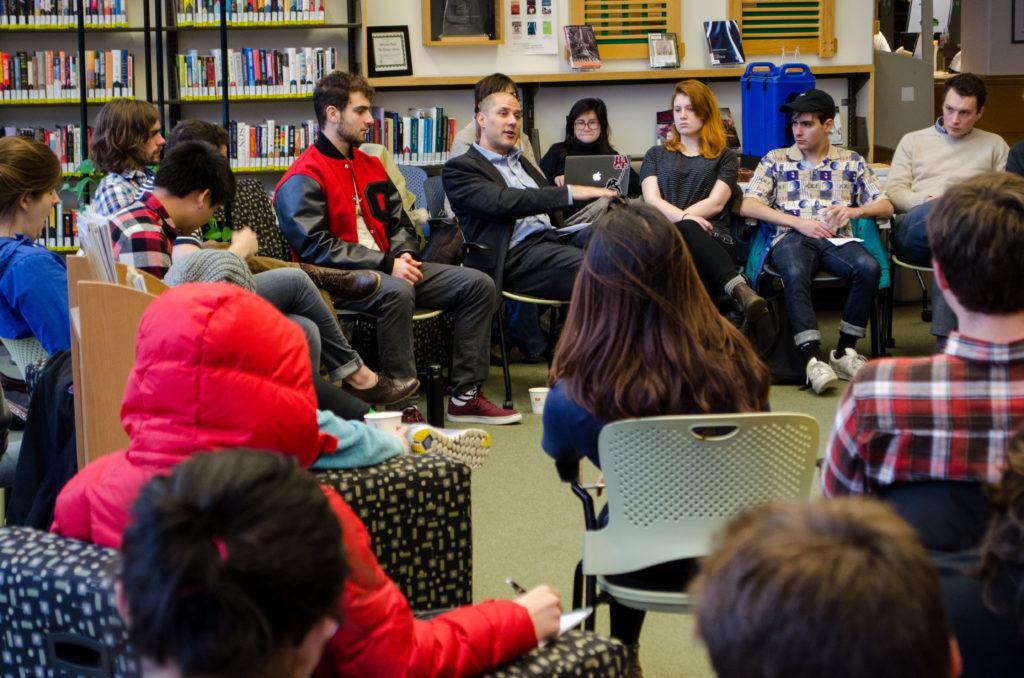Following the election and inauguration of President Donald Trump, analysts nationally and internationally been working to understand and predict the potential impact of the United States’ new administration.
Senior Transatlantic Fellow with the German Marshall Fund’s Europe Program and Bosch Fellow at the Transatlantic Academy Hans Kundnani spoke on the subject of “Europe in the Era of Trump” in the first of a series of “Coffee Talks” since the election that the Rosenfield Program has been hosting at 11 a.m. in Burling Lounge on Tuesdays. He possesses expertise in European foreign policy and transatlantic relations.
Kundnani began by describing a state of tension within the field of transatlantic policy analysis. “Nearly everyone in my world … of transatlantic policy think tanks, is basically trying to process the consequences of Trump. I think the consequences are so huge and complicated that we are all sort of struggling to figure out what it all means.”
Kundnani stressed that some of his analysis of the impact of President Trump on Europe could also be applied to much of the rest of the world.
“In a way, this could’ve been entitled the ‘World in the Era of Trump,’” he said, “I think in a way Europe is quite a good way of talking about the global consequences of the election of Trump for a few reasons. The first is that I think people in lots of other parts of the world, particularly Asia, have similar fears about the consequences of Trump as Europeans do.”
Much of his talk centered on the conflict between President Trump’s positions and the goals of Europe.
“I could go through and spend much more than 15 minutes on policy areas in which Trump seems to stand for the exact opposite of what Europeans stand for. In relation to that, it seems to me that the election of Trump is an unmitigated disaster for Europe.”
Kundnani characterized President Trump’s actions as having had the effect of turning the world of foreign policy upside down. He repeatedly emphasized that the impact of Trump’s conditionalization of America’s security guarantee to European countries would destabilize the post-war world order.
“This to me is an example of this crazy upside-down world in which we live now, where if the last three years or so, since the annexation of Crimea, in the foreign policy world the assumption was that the U.S. was tough and the Europeans were a bit weak,” he said. “There was this constant fear on both sides of the Atlantic that Europeans would go soft on the economic sanctions on Russia and that they’d seek to weaken the sanctions. Now you have the situation where the exact opposite is happening.”
“Similarly, as another illustration of this upside down world,” Kundnani continued, “you have European intelligence agencies who are worried about sharing intelligence with the U.S., because they are worried about them being leaky. As long as I can remember, going back to the early Cold War; the fear was that the European services were leaky. It’s very strange for anyone who has been in this world for any length of time.”
Kundnani went on to cover a broad range of topics concerning international politics. He compared and contrasted European and American nationalist and populist movements, as well as the effect the Trump administration has already had on trade in both Asia and Europe. He also raised the possibility of nuclear arms races in the Middle-East and Asia in response to the prospect of an isolationist United States.
The talk was well attended by students and professors who posed questions and participated in the discussion. Many students found the talk valuable and informative.
“I was most interested in the way he talked about populism,” said Nate Williams ’20. “He distinguished between a lot of different things that seemed like populism but were really just, for example, a neoliberal government with racism. I was also very interested in his comparison of Trump and Marie Le Pen. He gave insight into how the situations in France and Britain are very different, and how it isn’t productive to say ‘oh, everyone is getting their own Donald Trump,’ because it acts differently in different places.”
Other students, however, found the conversation pessimistic and discouraging.
“He was pretty pessimistic and uncertain,” said Jack Gustafson, ’19. “It was difficult because it was so speculative. We are kind of diving into this era of uncertainty. Because Trump was able to shake things up so much in the international order, we really don’t know where things will go. As discouraging as it seems, I think it is important to focus on what we can do domestically and act as resistance.”































































